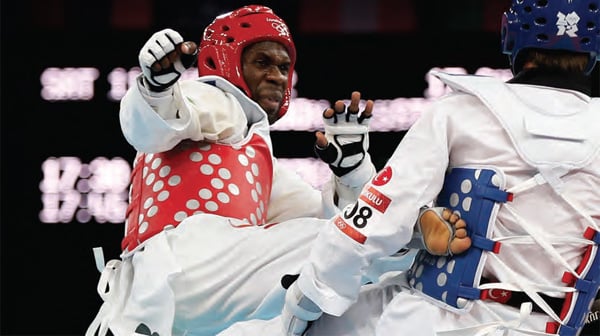
Seated in the first row at the U.S. National Junior Olympics taekwondo championship in 2000, Jin Song ’79 watched his son lose a national title in the last seconds of the tiebreaker match. “He used the [necessary] technique to earn the winning point, but one of the judges couldn’t score in time and the point came in too late,” Song says. “So the match went to his opponent.”
Song wanted to deck the slowpoke judge, but instead, the systems engineer went to his garage and started developing a solution. Twelve years later, at last summer’s Olympic games in London, Song sat alongside the judges monitoring the equipment of Truescore, the high-tech sensor- based automated scoring system that—after scoring 30,000 matches since 2006—has brought a new objectivity to the highest level of taekwondo competition.
“It turned out beyond our wildest hopes, and virtually eliminated controversy from the competition,” says Song.
“Competitive sports, such as wrestling, fencing, or boxing, are very difficult to score. In taekwondo, a good athlete can do four kicks in one second. Judges have to react quickly. Automating this part of scoring takes away that problem,” explains Song, himself a taekwondo black belt who trained with the student club during his time at Homewood, where he studied biomedical engineering and electrical engineering.
In taekwondo, points are awarded for accurate and powerful kicks and punches delivered to the opponent’s body or head. Traditionally, a panel of three judges watches the match and, when two judges witness the same point-scoring technique within a one-second window, points are awarded.
The Truescore system outfits contenders with sensors in their protective body gear and magnets in their footwear. When an opponent strikes the legal area with the foot, the sensors in the body protector detect the approaching foot by sensing the embedded magnet, and then another sensor measures the impact to determine whether it was powerful enough to warrant a point. The information picked up by the sensors is transmitted via wireless radio to a receiver connected to a computer at the judge table.
The application running in the computer receives the data, compares the magnitude of the impact against the pre-set threshold (which varies by weight class), and displays the result. The scoring to the body is automatic, without human factors. Judges remain responsible for scoring strikes to the head and for bonus points awarded for particularly difficult techniques.
Controversy like the one the Songs experienced in 2000 is often part of the sport. For example, the 2008 Beijing Olympics was marred with scoring issues, leading to the overturn of the results of one of the heavyweight women’s bouts. The sport was subsequently almost removed from the Olympic games; it was saved at least in part because of the new scoring practice, Song says, and the system’s subsequent success in London.
Meanwhile, Song—a longtime veteran of Silicon Valley who began working with sensors to build inertial navigation for smart bombs and planes and other defense-related communication equipment—has patented the technology and set up corporate headquarters in Fremont, California.
Song had a front-row seat for the London games when the taekwondo contender from Gabon, Anthony Obame, secured a spot in the final heavyweight division match with a last-second win over the three-time world champion. “All of a sudden, a point went up on the board and the end-of-theround bell rang. Everyone was thinking, ‘What just happened?’ They played the instant replay and it was clear that a foot had come up and scored that point. The judges, referees, and everyone were saying that wouldn’t have happened if the match wasn’t automatically scored,” says Song. A review of the event log indicated that the contact was made within one second of the match-ending bell.
Obame went on to the final match and earned a silver medal. Song says, “I ended up meeting the president of Gabon and congratulated him on his country’s first Olympic medal.”




